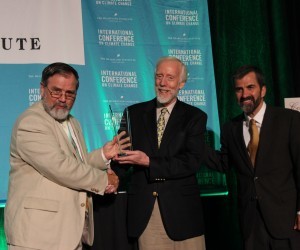[Editor’s note: Tom Harris, executive director of the International Climate Science Coalition, received the 2014 Excellence in Climate Science Communications Award at the Heartland Institute’s Ninth International Conference on Climate Change, July 8, in Las Vegas.]
At stake in the climate debate are billions of dollars, countless jobs, and, if President Obama was right, the fate of the environment. We need leaders in climate science, economics, engineering, and public policy to contribute to the discussion without fear of retribution.
Sadly, the opposite is happening. The debate is riddled with censorship, logical fallacies, defamation, and even death threats. As a result, many of the world’s leading experts will not comment publicly. If today’s discourse on global warming is an indication of the state of science-based policymaking, the world is in big trouble.
Ideally, opinion leaders in government, academia, and the press would call for an open debate on climate, inviting well-informed opinion from specialists on all sides of the issue, and would condemn anyone who tries to block them. Unfortunately, Obama, most university spokespeople, and the mainstream media instead fan the flames of intolerance, intentionally or otherwise, encouraging suppression, if not outright aggression, toward anyone who disagrees with politically correct climate dogma.
We urgently need scholars who specialize in rational argumentation to point out the fallacies sabotaging the discussion.
Philosophers to the Rescue
Since ancient Greece, philosophers have taught students to think and argue rationally. Socrates, Plato, Aristotle, and their intellectual descendants believed societies suffered if logical thinking is suppressed. The situation is no different today. We need philosophers to help get the climate debate back on track before it does us irreparable harm.
When people who question the causes of climate change are criticized as “right-wing, oil funded lobbyists,” philosophers should respond, “That is irrelevant. All that matters is whether what the skeptics are saying is correct or not.”
Philosophers must explain it is a fundamental error in reasoning to dismiss someone’s arguments because they appear to have a vested interest. It is the ‘motive intent’ logical fallacy.
Popular Arguments, Common Fallacies
Similarly, when skeptics are called deniers, philosophers should intervene, noting, “They are not denying. They are questioning, as all scientifically minded people should do when dealing with a complex, rapidly evolving field. The ‘deniers’ label is an attempt to equate those who question climate change causes to Holocaust deniers. It is an ‘ad hominem’ logical fallacy—’against the man,’ instead of engaging the idea.”
Motive intent and ad hominem fallacies are only two of the many logical errors philosophers should explain are poisoning the climate debate. Campaigners regularly use guilt by association, straw man arguments, and appeals to emotion, authority, and consensus to divert the public from considering skeptics arguments.
Particularly misleading is the fallacy of “affirming the consequent.” It works like this: ‘If my theory is true, then a logical consequence is X should turn red. X does turn red. Therefore my theory is true.’ This is a logical fallacy. Something unrelated to your theory could have caused X to turn red.
When climate campaigners arguing rising carbon dioxide (CO2) levels occurring concurrently with rising temperature proves the theory of CO2-induced global warming, philosophers should explain they are committing the fallacy of affirming the consequent. The fact scientific theories make correct experimental predictions does not mean the theories are true. Newton, Galileo, and their peers all knew this, but many of today’s climate scientists seem to have forgotten it. Philosophers must shine a light on this flaw.
Universal Truth Elusive
Finally, philosophers should refute the idea scientists discover universal, necessary, and certain truths. Truth applies to mathematics and games, because we establish the rules, but never to our findings about nature, which are educated opinions based on scientists’ interpretations of observations. Since empirical evidence has long been recognized as particular, contingent, and having some degree of probability, observation cannot be used to prove anything true.
This does not stop the United Nations Intergovernmental Panel on Climate Change from using observational evidence to prove supposed truths. For example, the very first sentence in the Synthesis Report of their Fourth Assessment Report starts, “Warming of the climate system is unequivocal, as is now evident from observations of….”
Philosophy Professor Steven Goldman of Lehigh University, who supports the dangerous human-caused global warming (DAGW) hypothesis, said (in a personal communication) this is “an attempt to persuade extra-logically.” Dr. David Wojick, who does not support the DAGW hypothesis, agreed, stating, “Reasoning from evidence is inductive logic. As for unequivocal, that is never the case in inductive logic.”
High-Minded Motives?
Why do more philosophers not alert the public to these serious mistakes in thinking?
Part of the answer may be the vast majority of philosophy professors are politically left of center and ‘stopping climate change’ is a cause liberals are expected to support. ‘Group think,’ fear of being out of step with their intellectual fellow travelers, can be an important driver encouraging conformity.
Academics may also think widespread acceptance of climate concerns will encourage pollution reduction, alternative energy, conservation, increased foreign aid, social justice, and world government—things many regard as beneficial. They keep their doubts to themselves to advance progressive policies.
Whatever their cause for silence, philosophers have a moral obligation speak out. The stakes are too high for society for them to do anything less.
Tom Harris ([email protected]) is executive director of the Ottawa, Canada-based International Climate Science Coalition (www.ClimateScienceInternational.org).





